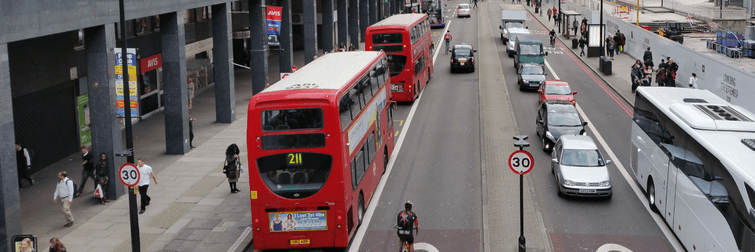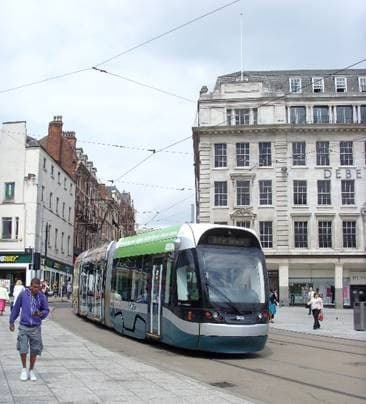
blog: Partnerships - the key to successful bus networks
Friday 12th March 2021
During the pandemic, Government financial support has been crucial in maintaining local bus networks and ensuring that services will still be there for the future. However, another beneficial feature has been the close working between bus operators and local authorities. In discussion, we have heard from a number of operators and local authorities that the need to work together to agree levels of service and priorities has been a very positive experience, offering a glimpse of what might be possible through a strong partnership approach in the longer term.
Furthermore, the ability to react quickly to changing circumstances has been noted, showing how adaptable and flexible the industry and other parties, including local authorities and the Office of the Traffic Commissioner, can be when necessary. These are useful lessons and go to further highlight the benefits of local authorities and operators working collaboratively.
What makes a successful bus partnership?
Across the industry, we’ve known for many years that partnerships can achieve great things, provided that all the right ingredients are in place. Indeed, even when formal partnership schemes are not in place, where a good spirit of joint working is evident, much can be achieved in terms of service improvements and developments when each party makes a positive contribution
It’s not about signing up to a formal partnership – it’s about organisations building trusting, open and can-do relationships, moving forward together with a clear shared vision and objectives and a desire to achieve ambitious outcomes; and, having agreed these, sticking with them and seeing them through. This is as much about the attitudes and behaviours of the people around the table as it is about the nature of any agreement or protocols that they might sign up to.
Where have partnerships worked already?
Over the years, various types of partnerships have been promoted. Some have been very successful; others have fallen by the wayside for various reasons, particularly lack of commitment. The Greater Nottingham Bus Partnership is an example of a very successful, long-standing partnership that has helped guide and deliver many improvements in the city’s bus network, ensuring that it maintains its position of enjoying much higher bus use per head of population than other similar sized cities.

The success of the partnership can be attributed to the commitment of all parties, the desire from all to deliver high quality services, the consistent approach taken over many years, and the belief that more can be achieved together.
We are pleased to have been a member of the partnership for several years, acting as an independent chair to help administer and run the partnership, offer objective advice, insights and different perspectives, and to provide challenge when necessary. The partnership has gone from strength to strength and recently introduced a new Advanced Quality Partnership Scheme (AQPS) for the next 10 years.
Partnerships don’t just happen. They need time and effort to ensure they remain meaningful and energised. Local authorities are under-resourced, having to concentrate their efforts onto day-to-day business – something that was highlighted as an issue last year by the National Audit Office in its report ‘Improving bus services in England outside London’. This may explain why the powers provided by the Bus Services Act 2017 haven’t been explored or exploited greatly by local authorities and why we have seen few AQPS or Enhanced Partnership Schemes developed. We would hope that the forthcoming National Bus Strategy would add further support and encouragement for such partnerships.
ITP has the skills to help facilitate partnerships
We at ITP have experience in the development of both types of partnership schemes, as well as in comparing them with franchising options for the Cambridgeshire & Peterborough Combined Authority. As such, we are well acquainted with the DfT’s guidance for each and the processes and procedures needed to be followed. We understand what can be achieved under both, as well as what extra benefit might be achieved through the additional work needed to develop an Enhanced Partnership, including confidence for operators that their investment might be protected and in ensuring that both parties are fully committed to delivering their investment plans.
Whilst there is much debate around franchising versus partnerships, we would argue that even franchising should be seen as a form of partnership. After all, the success of franchising will rely on good working relationships and collaboration, even within a formalised contractual relationship. We should remember that franchising doesn’t have to be along the lines of what we see in London. We would advocate the opportunity for franchising that creates shared responsibilities for local authority and operators to jointly plan the network and to share the risk, with operators retaining some commercial freedom.
Last year, we worked with Transport for West Midlands (TfWM) to devise and develop an Enhanced Partnership (EP) Plan (covering the entire West Midlands) and Scheme to cover the first two ‘Sprint’ corridors (Birmingham – Walsall; Birmingham – Solihull/Airport) in readiness for the 2022 Commonwealth Games. The EP supports significant investment in bus priority and passenger infrastructure, along with commitments for high quality, low or zero emission buses.
Currently, we are working with another authority and its local bus operators to form a Bus Partnership Group and introduce an AQPS, which will provide a framework for improvements in the bus network in the longer term, as well as guiding shorter-term recovery as we emerge from the pandemic.
ITP is well placed to assist in developing and facilitating the running of strong partnerships between local authorities, bus operators and other interested parties. We offer:
- Independence – to see different perspectives, offer challenge, seek common ground and achieve balance.
- Objectivity – advice and assistance based on evidence and experience.
- Technical understanding - knowledge of the legislation and DfT guidance, including the different stages, how and when to publish notices and involve different parties (such as Traffic Commissioner and Competition and Markets Authority), informal and formal engagement and public consultation.
- Our experience - from working with local authorities and bus operators across the country, including the establishment and development of partnerships.
- A diverse team - staff with time to focus on shaping meaningful partnerships, without the distractions of day-to-day tasks.
If you would like to discuss partnerships generally and how different types work, or consider how a potential partnership or other new ways of working might work in your area, please contact Peter Hardy at hardy@itpworld.net.
